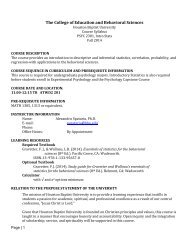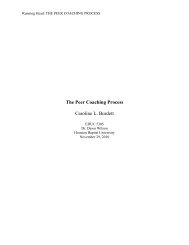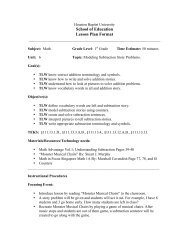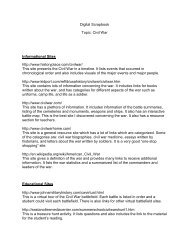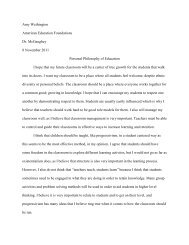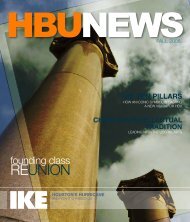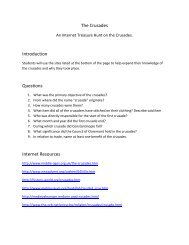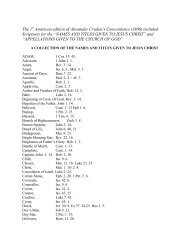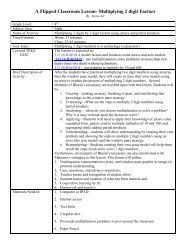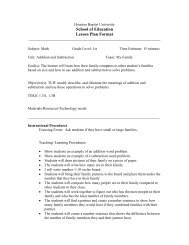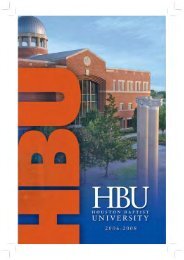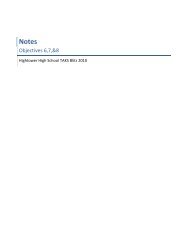2010-2011 HBU Catalog - Houston Baptist University
2010-2011 HBU Catalog - Houston Baptist University
2010-2011 HBU Catalog - Houston Baptist University
Create successful ePaper yourself
Turn your PDF publications into a flip-book with our unique Google optimized e-Paper software.
Academic Grievance Policy<br />
A student may file an academic grievance if he or she believes a grade was awarded improperly or for any<br />
academic grievance matter. The formal process is described below and must be followed by all parties in order<br />
to resolve a dispute. No one—student or faculty member—is permitted to ignore the process, follow it out of<br />
order, or appeal to authorities such as the President or Provost.<br />
1) The student should make an appointment with the faculty member in question to discuss the matter in person.<br />
The student is advised to keep his or her advisor apprised of the matter but this is not a requirement at this<br />
point. It is appropriate to try to resolve differences amicably and in person if at all possible before seeking to<br />
raise the matter to a higher level of authority than the classroom instructor. This is especially true at a Christian<br />
institution. If the student is concerned that a private meeting with the instructor will create antagonism, the<br />
student may skip to Step 2, but the student must make this concern known to the chair who controls Step 2 and<br />
explain in detail why he or she believes this to be the case.<br />
2) If the student continues to dispute the grade after the face-to-face meeting, the student may bring the matter to<br />
the chair of the department in which the course is located. This step requires the student to make a written<br />
appeal to the chair. At this step, the student must provide his or her advisor with a copy of the appeal (and the<br />
instructor if Step 1 was omitted). The chair will review the student‘s concern and consult with the classroom<br />
instructor, either individually or with both present. The chair will respond formally to the student and the<br />
instructor in writing of the chair‘s recommendation and notify the dean of the action.<br />
3) If the student is unsatisfied with the chair‘s recommendation, the student may bring the matter to the dean of the<br />
college in which the department resides—again, in writing. The dean will review the written appeal and consult<br />
with the chair, the classroom instructor, the advisor and the student, either individually or in a group as the dean<br />
deems appropriate. If the student requests, and the dean agrees, a Standards Committee will be formed by the<br />
dean who will serve as chair of the committee. The membership of the committee is composed of all parties<br />
heretofore mentioned, as well as any other faculty members the dean deems appropriate; no students other than<br />
the student making the complaint should be involved in any way. The Standards Committee hears the<br />
presentation of both parties. No legal representation or any other parties are allowed. After hearing both sides<br />
and after deliberation, at which time some parties may be excused from the room, the Committee, through the<br />
dean serving as chair, will render a judgment as to what it advises should be done. The Committee has no<br />
coercive authority to force the change of a grade; the purpose of the process is to bring clarity to all sides and<br />
allow a thoughtful and informed response from the disputants. The hearing aspect of the Committee process<br />
serves to assure integrity in the assigning of grades to students by faculty. The hearing and the rendering of a<br />
judgment to advise is the end of the process and no appeals to change a grade should be made to the Provost or<br />
the President. If a student wishes to take the step of contacting the Provost (the President is not to be contacted<br />
in these matters), the Provost will make a judgment as to whether to accept the appeal. If the Provost does<br />
agree to hear the matter, he or she will only consider two allegations: 1) that the process itself is unfair; 2) that<br />
the student was not treated fairly in the process. The burden will be on the student to demonstrate with facts<br />
and evidence that the process or the treatment was unfair. To repeat, the Provost will not hear an appeal to<br />
change a grade. Depending on the Provost‘s findings, the matter may be returned to the Standards Committee<br />
for further review.<br />
4) Throughout this process, if a student wishes to ask an <strong>HBU</strong> faculty member or an <strong>HBU</strong> administrator to serve as<br />
an advisor, that is permissible, but both the student and the advisor must make this fact known to all parties<br />
involved in the academic grievance process. At no time should any <strong>HBU</strong> employee advise a student<br />
anonymously or write an appeal document.<br />
5) If a student questions any grade as recorded in the Registrar‘s Office, the student has a period of one (1) year<br />
beginning with the end of the term in which the grade was awarded, or six (6) months after the degree is<br />
conferred (whichever comes sooner), to challenge the accuracy of the grade.<br />
Academic Integrity<br />
Academic integrity is valued at <strong>HBU</strong> and is at the very heart of the nature of the <strong>University</strong> as a Christian Liberal<br />
Arts Institution. It is the responsibility of all students, faculty and staff to demonstrate academic integrity. The<br />
Academic Integrity policy is designed to promote ―the development of moral character, the enrichment of<br />
spiritual lives, and the perpetuation of growth in Christian ideals.‖ (<strong>HBU</strong> Preamble). The Academic Integrity<br />
Committee is charged with the duty to provide instruction and learning resources that promote an understanding<br />
of academic integrity and support adherence to the Code for Academic Integrity.<br />
The Academic Integrity Committee created a tutorial on Academic Integrity module that assists students in<br />
understanding means by which to adhere to appropriate standards of documentation and presentation and thus<br />
maintaining honesty in their own academic work and acknowledgement of the work of others. Students are<br />
required to complete this tutorial during the first term in which they are enrolled at <strong>HBU</strong>.<br />
<strong>2010</strong>-<strong>2011</strong> <strong>HBU</strong> <strong>Catalog</strong> www.hbu.edu/catalog Page 44




